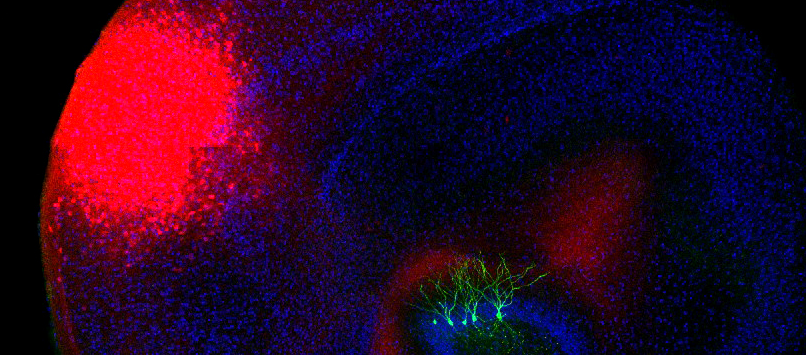Neurodegeneration: Endogenous and Exogenous drivers of synaptic pathology

Neurodegeneration is a major burden for the global healthcare system. It is characterized by an irreversible loss of neurons mostly occurring in elderly people that is caused by a variety of brain pathologies, including Alzheimer’s Disease, Morbus Parkinson and Frontotemporal Dementia. In early stages, synaptic dysfunction and microglial activation are commonly observed in these diseases. Until now, however, the etiology of neurodegenerative diseases remains widely unknown. In this research area, we investigate neurocentric and exogenous factors that might facilitate neurodegeneration-related synaptic and membrane dysfunction. Together with our collaborating partners, we ultimately aim at providing pathophysiological insights and novel therapeutic strategies that aim at restoring synaptic dysfunction in neurodegeneration.
Our experiments test for both Tau- and Aβ-induced synaptic degeneration on multiple levels, ranging from tissue culture models to human neocortical resections. Alongside investigations that elucidate ageing-related synaptic changes with their underlying mechanisms, we focus on metabolic and microbiome-related changes in synaptic flexibility, neuronal excitability, and glial cell function related to neurodegeneration.
Experimental methods:
- Organotypic brain tissue cultures
- Single-cell whole-cell patch-clamp recordings
- High-resolution confocal microscopy, synaptic microarchitecture
- Electron Microscopy
- Cytokine profiling
- Single-nuclei sequencing
- Crispr/Cas genetic engineering
Collaborating Partners:
Dr. Marijana Basic (Gnotobiology Facility, Institute for Laboratory Animal Science, MHH)
Prof. Dr. Evgeni Ponimaskin (Institute of Neurophysiology, MHH)
Prof. Dr. Kerstin Schwabe (Clinic of Neurosurgery, MHH)
Prof. Dr. Meike Stiesch (Department of Prosthetic Dentistry and Biomedical Materials Science, MHH)
For collaboration requests, please contact Dr. Pia Kruse (Group Leader, Kruse.Pia@mh-hannover.de) and Prof. Dr. Maximilian Lenz (neuroanatomie@mh-hannover.de).
Key publications:
All-trans retinoic acid induces synaptic plasticity in human cortical neurons. Lenz M, Kruse P, Eichler A, Straehle J, Beck J, Deller T, Vlachos A. Elife. 2021 Mar 30;10:e63026. doi: 10.7554/eLife.63026.
All-trans retinoic acid induces synaptopodin-dependent metaplasticity in mouse dentate granule cells. Lenz M, Eichler A, Kruse P, Muellerleile J, Deller T, Jedlicka P, Vlachos A. Elife. 2021 Nov 1;10:e71983. doi: 10.7554/eLife.71983.
Denervated mouse CA1 pyramidal neurons express homeostatic synaptic plasticity following entorhinal cortex lesion. Lenz M, Eichler A, Kruse P, Stöhr P, Kleidonas D, Galanis C, Lu H, Vlachos A. Front Mol Neurosci. 2023 Apr 12;16:1148219. doi: 10.3389/fnmol.2023.1148219. eCollection 2023.